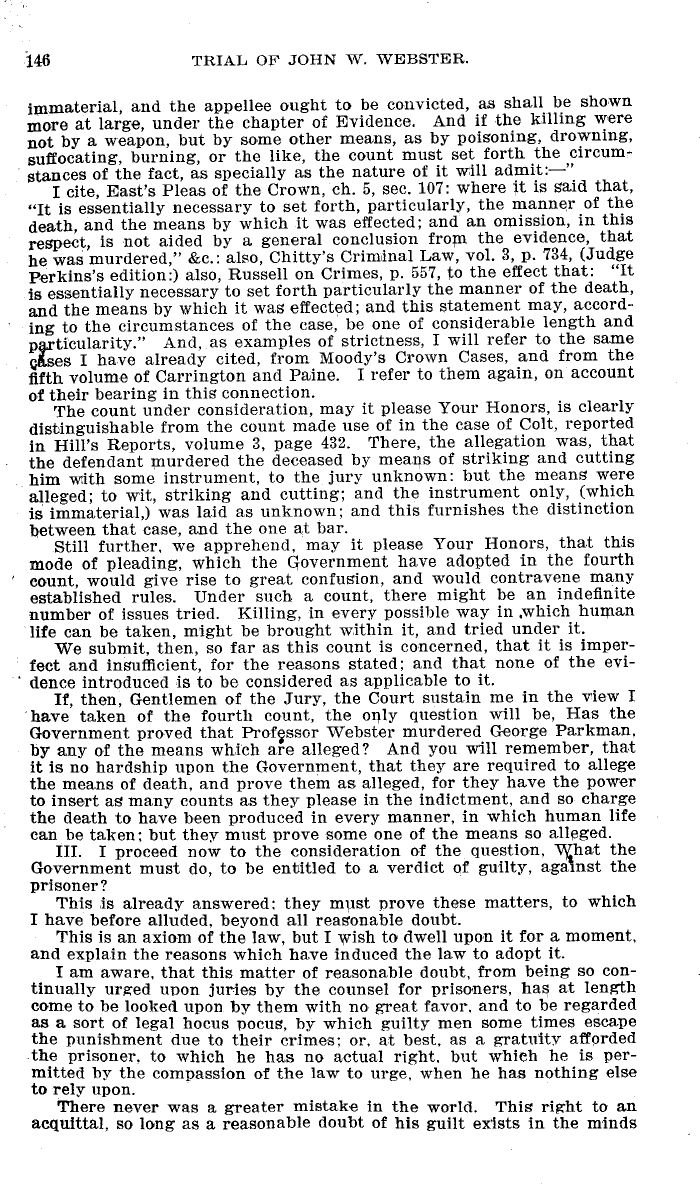|
146 TRIAL OF JOHN W. WEBSTER.
immaterial, and the appellee ought to be convicted, as shall be shown
more at large, under the chapter of Evidence. And if the killing were
not by a weapon, but by some other means, as by poisoning, drowning,
suffocating, burning, or the like, the count must set forth the circum-
stances of the fact, as specially as the nature of it will admit:-"
I cite, East's Pleas of the Crown, ch. 5, sec. 107: where it is said that,
"It is essentially necessary to set forth, particularly, the manner of the
death, and the means by which it was effected; and an omission, in this
respect, is not aided by a general conclusion from the evidence, that
he was murdered," &c.: also, Chitty's Criminal Law, vol. 3 p. 734, (Judge
Perkins's edition:) also, Russell on Crimes, p. 557, to the effect that: "It
is essentially necessary to set forth particularly the manner of the death,
and the means by which it was effected; and this statement may, accord-
ing to the circumstances of the case, be one of considerable length and
p~'ticularity." And, as examples of strictness, I will refer to the same
Q~es I have already cited, from Moody's Crown Cases, and from the
fifth volume of Carrington and Paine. I refer to them again, on account
of their bearing in this connection.
The count under consideration, may it please Your Honors, is clearly
distinguishable from the count made use of in the case of Colt, reported
in Hill's Reports, volume 3, page 432. There, the allegation was, that
the defendant murdered the deceased by means of striking and cutting
him with some instrument, to the jury unknown: but the means were
alleged; to wit, striking and cutting; and the instrument only, (which
is immaterial,) was laid as unknown; and this furnishes the distinction
between that case, and the one at bar.
Still further, we apprehend, may it please Your Honors, that this
mode of pleading, which the Government have adopted in the fourth
count, would give rise to great confusion, and would contravene many
established rules. Under such a count, there might be an indefinite
number of issues tried. Killing, in every possible way in ,which human
life can be taken, might be brought within it, and tried under it.
We submit, then, so far as this count is concerned, that it is imper-
fect and insufficient, for the reasons stated; and that none of the evi-
dence introduced is to be considered as applicable to it.
If, then, Gentlemen of the Jury, the Court sustain me in the view I
have taken of the fourth count, the only question will be, Has the
Government proved that Profgssor Webster murdered George Parkman,
by any of the means which are alleged? And you will remember, that
it is no hardship upon the Government, that they are required to allege
the means of death, and prove them as alleged, for they have the power
to insert as many counts as they please in the indictment, and so charge
the death to have been produced in every manner, in which human life
can he taken; but they must prove some one of the means so alleged.
III. I proceed now to the consideration of the question, hat the
Government must do, to be entitled to a verdict of guilty, aga, nst the
prisoner?
This is already answered; they must prove these matters, to which
I have before alluded, beyond all reasonable doubt.
This is an axiom of the law, but I wish to dwell upon it for a moment,
and explain the reasons which have induced the law to adopt it.
I am aware, that this matter of reasonable doubt, from being so con-
tinually urged upon juries by the counsel for prisoners, has at length
came to be looked upon by them with no great favor, and to be regarded
as a sort of legal hocus pocus, by which guilty men some times escape
the punishment due to their crimes; or, at best, as a gratuity afforded
the prisoner. to which he has no actual right, but which he is per-
mitted by the compassion of the law to urge, when he has nothing else
to rely upon.
There never was a greater mistake in the world. This right to an
acquittal, so long as a reasonable doubt of his guilt exists in the minds
|

